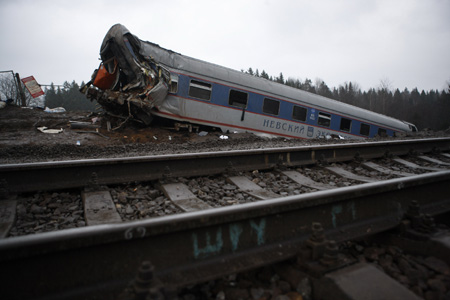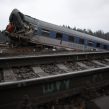
Strategic Countdown and Russia’s Escalating Instability
Publication: Eurasia Daily Monitor Volume: 6 Issue: 219
By:

This week is the last in the life of the Strategic Arms Reduction Treaty (START I) that was signed on July 31, 1991 by Presidents George Bush and Mikhail Gorbachev. This most complex treaty in the history of arms control expires on December 5, and the simple solution of extending its duration was rejected by Presidents Barack Obama and Dmitry Medvedev as unhelpful for the broader agenda of nuclear non-proliferation. Seeking to give substance to the idea of a “reset” in US-Russian relations, the two leaders committed last July to the “joint understanding” for a follow-on treaty, thus setting an extra-hard task and ultra-tight schedule for the working group laboring in Geneva. It is still possible –as Russian Foreign Minister Sergei Lavrov asserts– that a new document will indeed be signed before Obama arrives in Oslo to accept the Nobel Peace Prize on December 10 (RIA-Novosti, November 27). The rushed deal, however, would inevitably contain such an amount of omissions, loopholes and dubious compromises that its ratification by the US Congress and its compatibility with Russia’s strategic ambitions are problematic (Nezavisimoe Voennoe Obozrenie, November 27).
Obama’s decision to cancel the deployment of a radar in the Czech Republic and interceptor-missiles in Poland removed a major stumbling block for the negotiations, but he also has reiterated the commitment to building a strategic defense system, which is a major issue for Russia –and there is no way to address it in a new treaty (www.gazeta.ru, November 27). Another issue is the deterioration of Russia’s strategic arsenal as many antiquated systems are scrapped, while modernization programs –including the Bulava submarine-based missile– are stalled; this shrinking compels Moscow to agree on numerical limits that are far higher than its actual holdings in the near future and leaves many in the US questioning the rationale for unnecessary self-limitation. There are also numerous issues about verification (these technicalities take up the bulk of the 700 pages of START I) and the legal force of a new agreement in the period between signing and ratification; Moscow harbors deep concerns about US high-precision conventional weapons, including sea-based cruise missiles; there is no progress towards a common view on limiting non-strategic nuclear weapons (Nezavisimaya Gazeta, November 25; Nezavisimoe Voennoe Obozrenie, November 20). Russia is also at a serious disadvantage in the bargaining on these diverging positions because the old Soviet school of tough negotiators has dissolved, and the foreign ministry cannot mobilize quality expertise, while the military “bean counting” and risk assessment are distorted by the multiple reshuffling of the top brass (Vremya Novostei, November 27).
Political will emphatically demonstrated by the two leaders will probably overcome not only technical hurdles, but also entirely rational reservations expressed by veterans of arms control who understand the value of a new deal, which should help in building cooperation in other strategic matters –primarily Iran (Kommersant, November 12, 16). This triumph of de-nuclearization would, nevertheless, be no more helpful for Russia in addressing its real security risks than the START I was for the USSR, which spectacularly fell apart only a few months after the signing ceremony. These risks were illuminated by the colossal explosion at an ammunition depot in Ulyanovsk two weeks ago, and when a second explosion interrupted the work on securing the unexploded ordnance last week, Medvedev fired three generals and four colonels (Rossiyskaya Gazeta, November 26). This uncharacteristic toughness was perhaps meant to demonstrate that the young Commander-in-Chief could become so angry at sloppiness that punishment would precede investigation (Novaya Gazeta, November 27). What it actually revealed was the panic in the leadership about losing control over the rising instability, so that only strategic arsenals and the walled “villages” of the rich-and-powerful remain safe.
This instability has been escalating in the last few months along two parallel tracks: armed violent attacks and police brutality. Moscow had remained slightly concerned about the first trend so long as it was contained in the North Caucasus. The situation in this troubled region is indeed steadily deteriorating, particularly with a new wave of suicide bombings, and consequently Medvedev promised to implement additional measures in his address to the Federal Assembly on November 12, which has made little impression on the warring parties, as the assassination of the commander of a special police unit in Makhachkala, Dagestan showed (Kommersant, November 27). The real shock, however, was inflicted by the explosion that derailed the express train going from Moscow to St. Petersburg last Friday evening with more than two dozen casualties. This train is often used by politicians from St. Petersburg with careers in Moscow, who have suddenly discovered that this transport route cannot be made safe (Ekho Moskvy, November 28).
The crisis of law enforcement is unusual not in the scope of crime in which the police are implicated as in the sharp public criticism of brutality and corruption characterizing this criminalization. A polemical point made by a Duma deputy from the “ruling” United Russia party that the whole interior ministry system could not be reformed but only disbanded, has found surprisingly strong public support (www.gazeta.ru, November 25). Political commentators tend to interpret this media campaign as an attempt by several competing clans of siloviki to replace Interior Minister Rashid Nurgaliev, who is a firm Putin loyalist (Nezavisimaya Gazeta, November 27). Intrigues of this sort are ever-present but even the not-so-liberal professional elites were outraged by the death of the lawyer Sergei Magnitsky, who received no medical treatment in the detention cell where he had been held for months in the course of a dubious investigation against the Hermitage investment fund (Vedomosti, November 24).
Prime Minister Vladimir Putin had to answer some sharp questions during a business trip to France, but claimed unfamiliarity with the Magnitsky case, while comparing the shameful trial of Mikhail Khodorkovsky and Platon Lebedev with the conviction of Bernard Madoff for fraud (www.gazeta.ru, November 25). This parallel is clearly false, but Putin’s own system of power distinctly resembles a financial pyramid where the top crooks extract vast profits by cheating a great number of naive stakeholders; the moment of meltdown is hard to predict – but the collapse is typically very fast.




